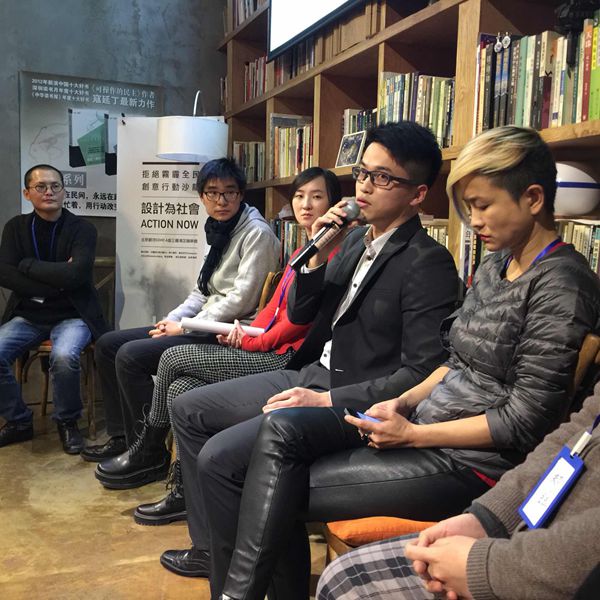China is now notorious for its poor air condition and has become almost synonymous with reoccurring smog. So it is not surprising that the account “The Survival Guide of Haze” has become popular on China’s most widely used messaging app Wechat and now there is a company dedicated to making it big.
The man behind the Guide, Fang Da, is a post-80s entrepreneur who has just turned 30 this year. A native of South China’s famous tourist city Hangzhou, one of the many cites in China that suffer from smog, Fang said he started self-education on air pollution out of desperation.
An avid amateur road bicycle racer, Fang was forced to lay off his cycling events because of smog and witnessed his friends suffer from health problems due to exposure to smog during training and competition, which drove him to the Internet and learn everything he could about air pollution.
The idea of sharing with the public what he had learnt not just about how serious the pollution is, but also about how to protect oneself occurred to him one day at the end of 2013, after a series of severe smog.
On November 23, 2013, Fang registered an official account on Wechat and began uploading articles about everything and anything that is related to smog, from the daily AQI to the latest brand of facial mask available on the market. Many of the articles were written by himself. He named the account The Survival Guide of Haze, which quickly caught on. A year later, the account now has over 100,000 members.

Smog many have stopped Fang from cycling, but it gave him the inspiration for The Survival Guide of Haze, his new entrepreneurial endeavor. Photo: Courtesy of Fang Da
“It’s a good name, isn’t it?” Fang Da laughed. “I used to run an advertisement company so I am pretty good at coming up with ideas.” The young man who majored in Korean language at Guangdong University of Foreign Studies has been running his own business since graduation. “It is a family thing,” he admitted. “My mom runs a business of her own as well.”
Fang does have a very smart and shrewd look about him. Yet he also appears to be candid and open as we talked in the McDonald’s at Beijing’s South Railway Station. He just got off the train for a business trip to the capital city which he jokingly refers to as the “disaster area”.
And it happened to be a day when Beijing was smog-free. But Fang was not going to let it mislead him. “Looks like Beijing welcomes me,” he quips. “I am here, and the smog is gone.”
A week ago Beijing was still shrouded in thick smog, or haze, as Fang prefers to call it. “I looked outside the window the entire way here. The further north the train goes, the thicker the haze. And here in Beijing, it is all clear,” Fang said. “I think about the two faces of China I’ve seen along the way: one hidden behind the smog, poor, gray and bleak, while the other is this, modern, clear and glittering. Which one is the real face of China?”
Then he answered it himself. “I think it is the first.”
From guidance to action
Fang started out by sending out his findings to everyone on his contact list on his phone. The reaction he got was beyond his estimation. Many people thanked him for sharing and asked for more information. Fang realized that many Chinese are still not aware of the severity of air pollution let alone methods to protect themselves from it. He saw an opportunity.
At first it was just Fang who wrote and posted articles on his mobile-based Survival Guide. Occasionally he got some help from his friends. The account’s popularity grew quickly and the number of members rose every day. Fang decided to do it full-time.
In April, he founded a consulting company using the money he gathered by selling his previous Internet company. Besides posting articles, the company also conducts testing of various products on the market such as air purifiers and facial masks and shares the test results for free, which is one of the many features that is welcomed by the members.
“The Guide has quite a following now. Many companies have approached me to have their products tested,” Fang revealed. He said some eventually decided to not send him samples because they were afraid that their products may not do well.
And what do they do when they find problems with the products? “We just go ahead and post it as it is,” Fang shrugs. “We don’t notify the manufacturers. That’s not part of the deal.”
Fang is known for picking on domestic manufactures. Following the fallout with a Chinese mask company whose product he called “useless”, Fang recently set his target on Xiaomi, the Chinese electronics company, which just launched a new air purifier. The Guide released a long article just ahead of its official launch date detailing how this new and reasonably priced model is in fact a copycat of an existing brand at a much higher price, which quickly went viral as someone reposted the article on the Internet.
High-profile cases like this helped boost the Guide’s popularity but also brought controversy. Fang has been very generous with his readers. Every once in a while, he gives out gifts such as free masks and pays for them to be delivered to the readers who participated in events organized by the Guide. Subscribers can also buy smog-related products from his website at a lower price, thanks to the deals he brokered with the manufactures.
Voices accusing Fang of being in cahoots with the manufacturers to make profit never stopped. Fang simply laughed it off. “I gave back to my readers because without them, the Guide will have no influence whatsoever. It is a way of saying thank you to them. You can’t win with everyone. I am fine with that. The truth is we have invested over a million RMB on this but we have not made profits yet.”

Fang speaking at the “Say No to Haze” Public Creative Action Week at the Galaxy SOHO in Beijing. Photo: Courtesy of Fang Da
Social consciousness
“Making money out of this is easy,” Fang quickly added. “But that is not my primary concern. I want to make the Guide a valuable platform. Many Chinese still have misconceptions about air pollution and many don’t know how to properly protect themselves. I am surprised no one is doing what I am doing. I consider it a way of giving back to society.”
“There is not yet another organization that takes this responsibility in the face of smog, which will only get worst in the foreseeable future,” Fang continued. “I will be honored if I could carry on with what I’ve been doing because it concerns the well-being of the entire nation.”
Fang plans to take his Guide from an on-line platform to off-line events as well. “It is a win-win-win situation. It certainly will benefit the public; it will create new markets for the manufactures that can provide reliable products; and it gives us something meaningful to do. So why not?”
| Touched | Sympathetic | Bored | Angry | Amused | Sad | Happy | No comment |
Rhythm Media Group is a multi-media company, operating a US-based Chinese daily newspaper, The China Press, and the paper's website - uschinapress.com (which has mobile-app version), as well as a Beijing-based English website Sino-US.com. The group boasts 15 branch offices across the US, and a number of cultural centers focusing on culture-related business in the North America, Chinese mainland, Hong Kong and Taiwan.Launched in September 2012, the Sino-US.com is designed to serve as a bridge between China and the US, and to keep its readership inside or outside China better informed by providing news and insights on China's current affairs, culture, life, business, people and sports.
|
|